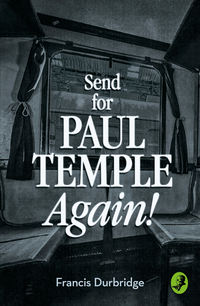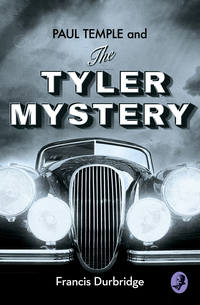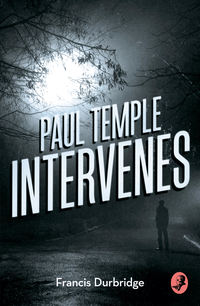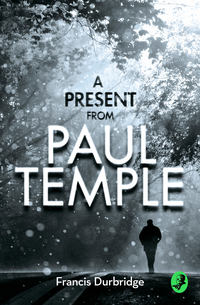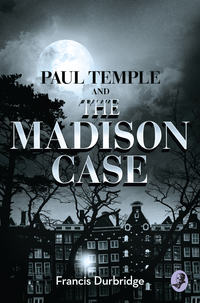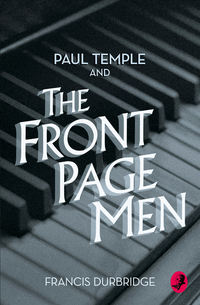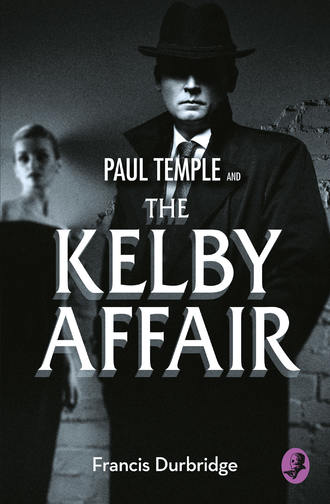
Полная версия
Paul Temple and the Kelby Affair
‘I’d like to see the town clerk. I’m Paul Temple.’
A painting of the first mayor in all his finery glared down the luxurious winding staircase. The cream and green colour scheme of the interior added a touch of Regency to the atmosphere. It seemed a shame that the building was so silent. The civic splendour of a bygone age. Paul followed the man down hushed corridors to an office looking on to the town square.
‘Mr Temple? I’m Ballard, town clerk. How can I help you?’
They shook hands and Paul sat in a winged leather armchair. The town clerk looked genuinely pleased to see him, which increased Paul’s suspicion that all the other rooms in the building were empty. Ballard was old, absent minded and extremely thin. Perhaps when the place had been evacuated they had forgotten to advise him, they may have even thought he had retired.
‘Things seem very quiet,’ said Paul.
‘It’s all this local government reorganisation. Most of our work has been taken over, and the staff have gone with the work. That’s centralisation, Mr Temple.’
‘But you still administer education from here—’
‘No,’ Ballard interrupted. ‘I suppose you’ve come about Mr Kelby. He’s a co-opted member of the subcommittee for this region. A very good man, very entertaining.’
‘Could you tell me what was on the agenda for Monday’s meeting?’
‘Nothing.’
‘You don’t think he would have been kidnapped to prevent him from attending the meeting? Or to put pressure on him to support some local issue?’
The town clerk was amused by the suggestion. ‘Certainly not. At all our meetings Mr Kelby is in a minority of one.’ His face was creased with happy appreciation. ‘I don’t think Mr Kelby is really in favour of education. He thinks it corrupts young minds, prevents them from learning and exploring.’ He chuckled. ‘Nobody takes Mr Kelby seriously in Melford Cross.’
Paul wondered why he was on the subcommittee.
‘Prestige, I suppose, and the school children love him. He’s very good at speech days.’
Paul asked about the publicity attending their subcommittee meetings.
‘You mean, would anybody know that he had a meeting that morning? Yes, anybody could have known. The meetings of each council cycle are published in the local press. If anybody wanted to know we would tell them and keep no record of the fact. They aren’t secret.’
‘Thanks,’ said Paul. He rose to leave. ‘You’ve been very helpful.’
‘I realised what you wanted to know.’ He showed Paul to the door and shook hands. ‘The police inspector asked the very same questions. He even asked why the building was so quiet. But he was rude, he cracked a joke about Larry the Lamb.’
Charlie Vosper was in charge of the case. He was at Melford House interviewing his suspects when Paul called on him fifteen minutes later. Charlie was a copper of the old school, not a bureaucrat. He was a good copper because he knew crooks, he respected them – the ones who were good at their job, and he even liked a lot of them. If Charlie hadn’t joined Scotland Yard and become an inspector he could have been a successful underworld boss. Paul Temple knew him of old. They even liked each other.
‘What do you want, Temple?’ Vosper asked rudely.
‘Just thought you might need some help.’
Charlie Vosper nodded. ‘Like I need a week in hospital. Do you know this chap Kelby?’
‘Slightly.’
‘Come into the library and tell me about him.’
Paul approved of the carved oak and the obvious solidity of the place. It indicated an old-fashioned taste for the good things of life. ‘Kelby seems quite a wealthy man,’ he said as he sat in the chair by the window. He could see the chauffeur–handyman on the lawn: a thickset fellow who was obviously a hard worker.
‘Did you think he was poor?’
‘No. But I thought he might be more superficial than these surroundings suggest.’ When Scott Reed had gone Paul had spent the evening reading history. It was one way of getting to grips with the missing man. And he had found that Kelby’s books were like his television appearances, so brilliant that you suspected him of showing off. He was provocative and witty. Not quite the academic historian.
‘He’s a shabby-looking bloke, I gather,’ said the inspector. ‘Lives a pretty dull life here in Melford.’
‘Yes. I was referring to his mind.’
‘Oh.’
Paul Temple talked for several minutes about the Kelby he had met and how their lives had occasionally intersected. But it didn’t add up to much. On the occasions when Kelby had been accompanied by a woman she had been thirty years younger than himself, which had also seemed ostentatious.
‘Young people have livelier minds,’ said Charlie Vosper. ‘Why should he be compelled to go about with women of his own age? He’s a widower.’
‘Really? I didn’t know he had been married.’
‘His wife died ten years ago. He has a son, Ronnie, who is staying here at the moment. He’s on holiday from America.’
‘Oh yes, of course. Scott Reed said something about avoiding the son; Kelby was fishing after a job for him.’
‘Mr Kelby and his son didn’t like each other,’ Vosper said grimly.
When Paul Temple saw the young man he could understand why. Ronnie was fair haired and charming in an obvious, straightforward way, and his mind was totally conventional. He must have been a grave disappointment to Kelby.
‘Do you think my father has been murdered?’ Ronnie asked.
Inspector Vosper was at his most intimidating. ‘Why, do you think he might have been?’
‘I don’t know. If he’d just been kidnapped we should have heard now, shouldn’t we? It’s five days since he left to attend that council meeting.’ He lit a cigarette and glanced nervously at the constable who was writing everything down. ‘The kidnappers would have asked us for the ransom, or something.’
‘The other alternative is that he simply cleared off. People are doing that all the time, they simply leave home. It isn’t against the law.’
Ronnie shrugged. ‘So what are you doing here?’
‘Making bloody sure, son. What did you do with yourself on Monday?’
‘Monday? Oh, I got up, drifted about—’
‘What time did you get up?’
‘Half past nine.’
‘And where did you drift?’
‘Around the house until lunchtime. I usually spend the morning trying to seduce Miss Leonard. She’s my father’s assistant. Then when I fail I go down to the pub for lunch or over to the golf club. It consoles me, you understand, restores my faith in my virility. On Monday I went over to the golf club and went round with the pro. There was nobody else about and I don’t have any friends in Melford. I came back to the house feeling sorry for myself.’
‘Time?’
‘Oh, between four and five. Then I wrote off for a job.’
‘What job?’
‘With the Arts Council of Great Britain.’
Paul found that his attention was straying as the routine interviews proceeded. He ought to have been interested, as Vosper said, to watch somebody else at work. But Paul hadn’t yet acclimatised himself to the English times. In America they were hours behind and they never went to bed.
He stopped yawning when Tracy Leonard came into the room. She was tall and twenty-five and had straight brown hair. She wasn’t the type to take bullying from Charlie Vosper. She didn’t take to the bluff, fatherly manner either.
‘Mr Kelby is a historian, inspector. He needs his books and his papers, otherwise he can’t work. And he had promised Neville Chamberlain to his publisher by October.’
‘Neville Chamberlain?’ said Vosper blankly.
‘He was prime minister before the war.’
‘I know who he was, Miss Leonard! I just fail to see what Neville Chamberlain has to do with your employer’s disappearance!’
She smiled patiently, a demure advertisement for the very best toothpaste. ‘I am explaining to you that Mr Kelby cannot have left home voluntarily. He is writing a book on Neville Chamberlain, and obviously he will have done absolutely no work this week. He has to work here, among all this.’ She gestured eloquently at the muddle of the library.
Charlie Vosper took three deep breaths and composed his leathery face back into a friendly expression. ‘Well, that seems to imply that he was removed by force. After all, if he were lost or had fallen ill the local police would have found him. They’re known from here to London as the Blue Berets.’ He chuckled to prove his good nature, the policeman with a sense of humour.
‘How did you spend last Monday?’ he asked her.
‘I worked all day. I have a room in what Mr Kelby calls the east wing. It’s a room built on to the side of the house. I came through at nine o’clock and opened the post, sorted out the day’s work…’ She had worked for Kelby for several years and her routine was established.
‘When did you realise Mr Kelby was missing?’
Tracy Leonard smiled. She regarded that as a silly question. ‘He was due back from the town hall around one, and he didn’t return. If you mean when did I really become worried, that was in the evening. Ronnie Kelby and I spent half the evening doing a tour of Melford. We searched everywhere he was likely to be. And then at about ten o’clock we went to the police.’
‘Did Ronnie Kelby,’ the inspector asked surprisingly, ‘share your concern?’
‘I think so. He went for three hours without making a pass at me.’
‘How galling for you.’
‘It’s like having fleas, you don’t notice them after a while.’
Tracy Leonard had been one of Kelby’s brightest students; she had stayed on to do research with him when all her contemporaries had taken jobs as schoolteachers, and she had given up university life when Kelby had. She thought he was a great historian.
‘Have you any idea why he would have been taken by force?’
‘I assume somebody wanted to get their hands on that diary.’
‘What diary?’
‘The diary that Scott Reed left with him on Monday morning. It seemed to be an important historical document.’
Charlie Vosper rose slowly to his feet. ‘You didn’t tell me anything about a diary.’
‘You didn’t ask me. It was apparently rather valuable.’
Paul intervened tactfully to save the girl from the massive wrath of the law. ‘Rather scandalous, actually. I should think a lot of people would give a lot to have it suppressed.’
‘You knew about this?’ Charlie shouted.
‘I assumed everybody knew.’
Charlie Vosper was turning a terrible shade of mauve.
*
‘No, he wasn’t shouting, Mrs Ashwood. The inspector has one of those voices that carries a long way.’ Paul Temple lifted the ladle to his lips and tasted the stew. ‘Especially when he’s angry. This is a stew like they used to make it in the depths of the country, Mrs A.’
‘Mr Kelby is very partial to it, sir.’
‘I’m not surprised.’ Paul continued his approving tour of the kitchen. ‘How long have you been with Mr Kelby?’
‘Oh, it must be more than ten years now. Leo and I moved in when Mrs Kelby was taken ill. That was a sad time for Mr Kelby and he found he needed help. He’s such a good man. We did everything we could to keep this a home for him, especially after she died. Do you think he’ll be all right?’
‘I trust so, Mrs Ashwood. I really hope so.’ She was a large, motherly woman and she was clearly devoted to her employer. Paul sensed the grief that such disruptions of normal domesticity can cause; suddenly Kelby was a human being and it mattered that he should be well.
‘Is Leo your husband?’
‘Yes, that’s right.’
‘I saw him working in the grounds.’
‘He’s a hard worker. It takes his mind off the trouble. Leo is more like a friend of Mr Kelby than just the handyman.’ She allowed a brief laugh to ripple through her ample body. ‘Mr Kelby always says that Leo taught him to be a countryman. They’re very close.’
It was relaxing in the kitchen. Gladys Ashwood lived in a nice world of nice people. She was sympathetic about Mr Ronnie. ‘Well, he was devoted to his mother. Her death was such a blow that he needed somebody to blame. He blamed Mr Kelby. But they’ve made it up now. Mr Kelby was so pleased that his son came home the other week. There’s even talk of Mr Ronnie staying…’ She liked Tracy Leonard: ‘Such a brilliant girl and ever so much the lady. She’s been here for nearly five years…’ None of these nice people would ever harm Mr Kelby. The only person she had bad words to say about was Ted Mortimer.
‘I feel responsible in a way,’ she was saying. ‘Ted Mortimer used to be very close with my husband and me. We used to see a lot of him. But he’s not a countryman. He was in the merchant navy.’
Paul was drinking a cup of tea she had poured him and he scarcely heard her story about the row Kelby had with the neighbouring farmer. ‘Mr Kelby was going over there on Monday afternoon,’ she said, and the words registered with a sudden shock.
‘What did you say, Mrs Ashwood?’
‘To see Ted Mortimer. He was going over to Galloway Farm—’
‘Did he ever arrive?’
‘I couldn’t say.’
‘What was their row about?’
‘I wouldn’t know, Mr Temple, but they do say in the village that there was a quarrel about money. We don’t see Ted Mortimer any more, you see, and I’m not one to gossip myself—’
‘Of course you aren’t, Mrs Ashwood. But you’re a wonderful raconteur. Excuse me if I dash away.’ He squeezed her shoulder affectionately. ‘By the way, this is my card. If you do remember any gossip, please let me know. I’m a devil of a gossip myself.’
She was laughing complacently as he left the kitchen and collided in the hall with Charlie Vosper. The inspector had come running from the library.
‘Where are you off to?’ Vosper asked suspiciously.
‘Me? Oh, I thought I’d make a tour of the neighbouring farms. It hasn’t been done, has it?’
‘No, it hasn’t. Would you mind driving with me, Temple? I’d like to be sure I know all that you know before we search Ted Mortimer’s place. I like to keep abreast.’
They walked across the drive towards the police car with studied casualness. But the inspector reached it first.
Chapter 4
‘OF course there never was such a diary, my dear. How could there be when Dickie never had such a mistress? Dickie had his faults, I’d be the first to admit them: he was a bore and he danced abominably, but I never noticed people rushing off to enter up their diaries whenever Dickie trod on their corns. What did you say this person’s name was?’
Steve persevered with the assignment. ‘Miss Spender. Margaret Spender.’
‘Never heard of her!’
‘She was your husband’s secretary.’
The frail old lady said: ‘Oh!’ like an ancient bird sighting a small field mouse. ‘That Miss Spender. I always felt sorry for her. She was a big girl. We called her the last of the big Spenders.’ Her eyes sparkled with malicious life.
‘Miss Spender did keep a diary for those ten years,’ said Steve, ‘and of course that included the period after the war when your husband was murdered.’
‘Killed, dear. It could have been an accident. I expect it gave her something to do in the evenings.’
‘And now that she is dead her sister has decided to publish it.’
‘How very demeaning.’
Steve had felt slightly nervous when she arrived at Delamore House. But she had made an appointment with Lady Delamore’s secretary, which Paul had said was significant. She’s worried, he had said, or else she wants to know what is going on. A butler had shown Steve into the drawing room; and then Lady Delamore had bustled in calling for Simpson to bring tea.
‘We’ll have tea early today,’ she had said pedantically. It was only ten minutes to four. ‘Mrs Temple looks as if she needs sustenance.’
She was not putting Steve at her ease.
‘You young people are so thin these days. I’m thin, but then I’m eighty-five. When I was your age I had a generous bosom and a bottom you could really sit on.’
‘You must have led a busy life in those—’
‘It must be all this unisex that you people go in for these days. It makes everybody thin.’
The butler brought in tea at that point. It gave Steve an excuse to change the subject. She talked about the diary although Lady Delamore’s attention soon wandered.
‘How do you come to be involved in this?’ she suddenly demanded.
‘My husband is a crime writer, and it was his publisher who acquired the diary.’
‘Crime, eh?’ She laughed derisively. ‘It’s a little late for solving any of the mysteries which surrounded my husband’s death. Those of us who are still alive have forgotten what little we knew.’
‘Nobody is trying to solve anything, Lady Delamore,’ Steve said provocatively. ‘The solutions are all given in the diary.’
‘Which has disappeared, you said?’
‘A man has disappeared, Lady Delamore. The historian, Alfred Kelby. The diary is incidental, although if we found that we might also find Mr Kelby. My husband wondered whether you, or some of your friends, might be being blackmailed. Whoever has this diary might try to extort money by it.’
‘I never pay blackmailers,’ she pronounced aphoristically, ‘and none of my friends have any money. I’m sorry I couldn’t be more help.’
Steve helped herself to another tea cake. ‘Alfred Kelby was reading the diary to give his opinion on its historical authenticity,’ she said.
‘I don’t understand. Do you mean he could confirm that my husband was really murdered? And murdered by whomever Miss Spender accuses? Surely if Mr Kelby knew that he should have said in 1947, when poor Sir Philip Tranmere was arrested. I believe there was a Mr Kelby in the party up at the shooting lodge at the time, but I don’t remember that he was really in with the best people.’
Steve suggested that Mr Kelby could find the diary explanation convincing or not. ‘He would know the people involved, and he might be a better witness than you, Lady Delamore, on the subject of Miss Spender.’
‘What would a historian know of my poor late husband’s sexual relationships? This publisher should have asked me. I could have told him that Dickie’s morals were above reproach. He snored in his sleep and his feet smelled. Those are not characteristics that attract stray women. What is more, after three whiskies he fell fast asleep. What would he want with a mistress? I never knew a man who slept as much as Dickie.’
Lady Delamore had already spent eighty-five years of her life keeping people in their place. Steve found it almost impossible to guess whether she was worried, guilty, or sublimely above the contemporary world. But just as she was about to leave the butler appeared.
‘Excuse me, my lady. Sir Philip Tranmere is on the telephone.’
‘I’ll ring him back, Simpson.’
‘He says that it is most urgent, my lady.’
Lady Delamore sighed. ‘The silly man. It is not urgent to me. Tell him that everything is perfectly in order, and I’ll ring him this evening. Mrs Temple is about to leave.’
Steve left. After the afternoon’s ordeal it was almost a shock to see the mini and maxi skirts and fashionable long hair, people on the streets who belonged unmistakably to the 1970s.
Paul was still out when she reached home. So Steve helped Kate with the housework and allowed her mind to freewheel over the things Lady Delamore had said. She had a record sleeve to design by Monday, but she didn’t want to become absorbed in anything else until she had talked to Paul. He arrived shortly after nine o’clock to find Steve doodling at the drawing board.
‘Lady Delamore didn’t feel worried or guilty, I’m sure of that,’ Steve assured him. ‘In fact I don’t think she gives a damn about anything or anybody. I only hope I’ll be like that when I’m eighty-five. She was so dreadful she was rather splendid.’
Paul laughed. ‘I’m sure that when you’re eighty-five you’ll be absolutely appalling!’
‘Flatterer.’
‘It’s nice to be back.’ He poured himself a whisky and sat beside Steve. ‘Hello, have you been commissioned to do some work?’
‘Yes, I saw Jeremy while you were away.’ She smiled quickly. ‘He said the work was flowing in again. Design looks up. Britain will look a better place to live in—’
‘That sounds like Jeremy. While I was pounding along the Atlantic seaboard earning dollars for Britain Jeremy was seducing my wife with record sleeves.’
Steve laughed. ‘I sat here night after night, thinking of you and knitting in front of the fire. I read Dylan Thomas in America to keep myself company. But did you miss me?’
‘I’ll say I did, my darling.’ He kissed her cheek. ‘Next time I see Jeremy I’ll punch him on the nose. Do you want some whisky?’
‘Not at the moment. I’ve spent a hideous afternoon to discover what that old crone knew about the diary. So listen and sound interested.’
‘Mm. Tell me.’
‘I think the diary is probably in her possession.’
Paul stood up in amazement. ‘Really? Steve, you’re marvellous! How did you establish that?’
She shrugged. ‘I didn’t. Call it feminine intuition.’
‘Oh, that. You mean you’re guessing.’
‘I’m convinced of it. Can I have some brandy?’
Paul went across to the sideboard and opened a bottle of brandy. ‘I suppose she would be the number one suspect for stealing it. But I can’t see an eighty-five-year-old woman kidnapping Kelby.’ He looked at the bottle for a moment, then said quietly: ‘Did I tell you? We found Kelby this afternoon.’
Charlie Vosper had driven like a stunt man in a silent film to reach Ted Mortimer’s farm. He had telephoned for two constables to conduct a search of the premises. The constables arrived from the opposite direction at the same time as Charlie Vosper swung into Galloway Farm and narrowly missed three hens out for a walk. They drove in convoy past the barn and cattle sheds alongside a field of sheep to the rambling farmhouse. By the time the two cars had skidded to a halt Ted Mortimer was already in the doorway.
‘Do you realise it’s dangerous to drive at that speed?’ he demanded.
He was a big man with a red, weather-beaten face. His arms were tattooed with swords and snakes. An aggressive man who was none too pleased to see the police.
‘What’s all the panic?’ he asked.
Charlie Vosper showed his identification. ‘We’re investigating the disappearance of Mr Alfred Kelby. I believe you knew him. He’s been missing since Monday morning, and I wondered whether you could help us to locate him.’
Mortimer shook his head. ‘I’m sorry, I can’t. Kelby and I weren’t really on visiting terms.’
‘He was coming over here on Monday afternoon.’
‘That’s right. But he never arrived.’
Charlie Vosper stared at the farmer, deciding whether he was ‘straight’ or not. It was a careful examination and Paul could see why the man should glare so aggressively back.
‘Do you mind if we look over your farm?’
Mortimer was ungracious. ‘Go ahead if you must, but don’t disturb my livestock. They aren’t used to policemen.’
The farm was obviously run down. Ted Mortimer himself bore a grudge against the world, and his men bore a grudge against Ted Mortimer. The animals obviously didn’t give a damn for anyone. It was something to do with the weather, Paul decided as he wandered round in the wake of the police. The weather was always bad for farmers.
‘Bad weather for the crops,’ he said conversationally to Ted Mortimer as they came out of the tractor shed.
‘We’re mainly livestock here,’ he said. ‘Dairy farm.’
Paul nodded. ‘Shocking weather.’
The two constables had been through the rooms and attic and cellars of the house, without success. Of course a body could have been buried in the fields. But they went through the outhouses and ramshackle cattle sheds systematically. They found Kelby when they reached the barn.
The barn was built on two levels. The ground level was scattered with sacks of fertiliser and a set of disc harrows. On the upper level a rusty old bath kept company with an abandoned sewing machine, a child’s rocking horse and an odd assortment of junk. One of the constables on the top level was leaning out of the loading bay as Charlie Vosper and Paul Temple reached the doors.


